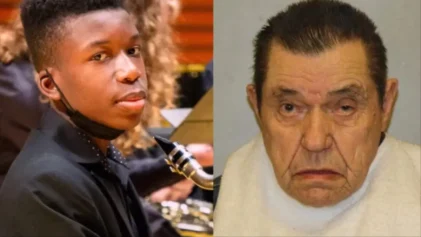A law clerk hired recently by Supreme Court Justice Clarence Thomas amid allegations of bigotry cleaned up her public image by recasting the narrative surrounding the 2015 incident in which she was accused of sending a racist text message to a former colleague, the New Yorker reports.
Crystal Clanton, who graduated from George Mason University’s Antonin Scalia Law School in Virginia in 2022, was hired by Justice Thomas in late February following her meteoric rise to the highly coveted position with the nation’s highest court as a new theory portrays her as the victim of a vengeful co-worker.
The racial controversy arose in 2015 when Clanton served as the national field director for the conservative student organization Turning Point USA, a Republican advocacy group closely tied to former President Donald Trump, also known for its divisive rhetoric.

Two years later, an investigative report by The New Yorker exposed Clanton’s text message in which she told a co-worker: “I HATE BLACK PEOPLE … Like f- – – them all … I hate blacks. End of story.”
Screenshots of the string of messages marked with Clanton’s phone number were shared with the magazine in 2017, and multiple employees at the time confirmed Clanton as the sender.
When confronted about the messages, Clanton explained that she couldn’t remember writing them and asserted that the comments did not “reflect what I believe or who I am,” she told the news outlet at the time.
Clanton resigned in disgrace over the incident, but she never apologized to the Black community for the hurtful comments that led to her 2017 ouster as the second-in-command of the conservative group.
Nearly a decade after she allegedly sent the texts, Clanton has managed to move past the episode while benefiting from powerful connections in the Republican legal community and beyond, including Thomas’ wife, Ginni, who hired Clanton in 2017 to assist her work as a national conservative activist.
As part of the arrangement, Justice Thomas allowed Clanton to live in their Virginia home for almost a year as Ginni Thomas and Clanton knew each other through Turning Point USA.
During this time, the Thomases encouraged Clanton to pursue a legal career, and Justice Thomas even recommended her for admission to the Antonin Scalia Law School despite her questionable background.
After graduating from law school, Clanton was immediately hired as a law clerk for two Republican-appointed federal judges, including U.S. District Judge Corey Maze in Birmingham, Alabama, and later Chief Judge William H. Pryor Jr. of the U.S. Court of Appeals for the Eleventh Circuit, known for his conservative rulings and for matriculating new law clerks to Justice Thomas.
The Thomases’ support and Clanton’s subsequent rise have kept the spotlight on her past controversy, which might otherwise have faded into obscurity.
In 2021, reports resurfaced about the racism allegations against Clanton just as she lined up clerkships with Maze and Pryor.
At the time, Democrats on the House Judiciary Committee became aware of the racist incident and filed an ethics complaint against Maze and Pryor amid concerns that Clanton’s hiring would undermine trust in the federal court system.
The complaint was ultimately dismissed in the 2nd U.S. Circuit Judicial Council in New York after Justice Thomas defended Clanton in a letter to Chief Judge Debra Ann Livingston, saying his wife had “informed me of the horrible way” Clanton “had been treated at Turning Point.”
Judge Pryor also wrote a letter to Livingston, revealing that he and Thomas met privately and discussed the matter involving Clanton, leading to a new theory about the incident, which held that Clanton was the actual victim.
However, this immediately raised questions as to why Clanton had never mentioned this throughout the ensuing firestorm.
Pryor said Clanton had not previously denied the racist text allegations because she was supposedly bound by a nondisclosure agreement, which she had not mentioned to reporters or her lawyer at the time. Clanton’s lawyer said he never prepared an NDA for her.
In his plea to the judge, Pryor said Justice Thomas assured him that Clanton “was a victim of a pernicious attempt to portray her as a racist” while claiming that a former employee who was not named had “created fake text messages” that would implicate other employees for misconduct.
Livingston’s ruling stated that the original news coverage about Clanton was false and that Clanton had always treated everyone with “kindness, respect, and fairness” while noting the facts presented by Judge Pryor, who maintained the racist texts were fabricated while touting Clanton as highly qualified.
The judge concluded that Pryor and Maze had performed all necessary due diligence, allowing Clanton to quietly move on from the debacle, leading to her hiring by Thomas to work in his chambers on the nation’s highest court.
In recent weeks, Clanton’s story has emerged as a rallying cry for conservatives who view her as a casualty of false accusations and apparent cancel culture, suggesting that the racist texts were manufactured to tarnish her reputation.
After heat from the debacle died down, Clanton began claiming that she resigned from Turning Point USA, but the head of the nonprofit, Charlie Kirk, who was Clanton’s boss when she sent the racist text message, previously suggested that Clanton was fired due to the incident.
“Turning Point assessed the situation and took decisive action within 72 hours,” he told The New Yorker in an email. Four years later, the nonprofit officially confirmed that Clanton was “terminated from Turning Point after the discovery of problematic texts.”
But when contacted by Judge Pryor, Kirk changed his story, saying, “The media has alleged that Crystal said and did things that are simply untrue.”
The U.S. Judicial Conference’s Judicial Conduct and Disability Committee tried to investigate the allegations against Clanton further. They asked a special committee to find out if Clanton had made the racist statements and what she had told Pryor and Maze. The special committee suggested interviewing Clanton and the witnesses mentioned in media reports, but so far, that has not occurred.
Judge Pryor and Judge Maze invoked a legal doctrine that blocked the Judicial Conference from reconsidering Livingston’s ruling to shut down the ethics complaint concerning Clanton.
Supporters of Justice Thomas saw this as within his discretion, citing the close relationship between justices and clerks. However, critics view it as yet another instance of Justice Thomas ignoring ethical rules.
Justice Thomas, Ginni Thomas, and Judge Maze declined to comment, while Judge Pryor did not respond, according to The New Yorker.
Despite skepticism over the cleaned-up version of what happened, Clanton continues to receive significant support from Justice Thomas, several federal judges, and prominent Republican political groups.
She stands to gain significantly from the Supreme Court clerkship, which typically lasts for a year and is extremely lucrative in both professional and financial terms.
Former clerks often receive substantial bonuses that can exceed half a million dollars when they sign on for their first real jobs after the clerkship. Additionally, having a Supreme Court clerkship on one’s résumé opens doors to prestigious academic and political positions, and increases the likelihood of future appointment to the federal bench.
Typically, only elite law students with outstanding résumés get a shot to serve as a Supreme Court clerk, while behavioral factors, such as termination for alleged racist remarks, could normally disqualify a candidate.
But Clanton was able to sidestep these concerns as Ginni Thomas went to bat for her new legal assistant, as shown in a leaked video from a Council for National Policy meeting in 2019. In the footage, Thomas introduced Clanton as her special conservative guest and described her as “the wind in my sails.”


